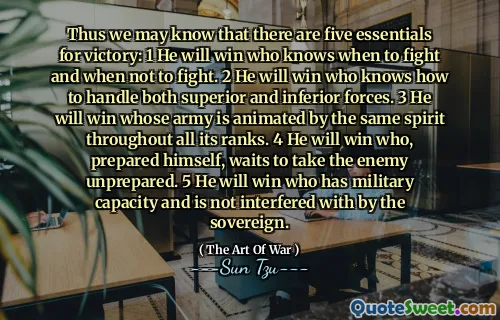
Thus we may know that there are five essentials for victory: 1 He will win who knows when to fight and when not to fight. 2 He will win who knows how to handle both superior and inferior forces. 3 He will win whose army is animated by the same spirit throughout all its ranks. 4 He will win who, prepared himself, waits to take the enemy unprepared. 5 He will win who has military capacity and is not interfered with by the sovereign.
📖 Sun Tzu
This quote from Sun Tzu's The Art of War distills the core principles that govern successful military strategy, principles which resonate far beyond the battlefield. The first essential underscores the importance of discernment and timing — knowing when to engage in conflict and when to avoid it reflects wisdom and situational awareness. This concept extends to various aspects of life and leadership where choosing battles wisely can lead to success or failure.
Handling both superior and inferior forces (the second point) highlights adaptability and the skill to leverage one's strengths effectively against diverse challenges. Whether facing a stronger adversary or an easier target, understanding how to manage different scenarios with tactical precision is crucial.
The unity of spirit within an army (third point) serves as a reminder of morale and cohesion's power. An aligned and motivated group is far more effective than a disjointed one, emphasizing the role of leadership in creating and maintaining shared purpose.
Preparation coupled with the element of surprise (fourth) is a cornerstone of strategy. Being ready oneself while catching the enemy off guard can shift the balance of power decisively.
Finally, having military capacity free from external interference (fifth) speaks to the importance of autonomy and command integrity. Without undue interference, leaders can execute their strategies proficiently.
Overall, these essentials reflect timeless wisdom about strategy, leadership, and human dynamics, each point deeply interconnected with aspects of planning, unity, and judicious action. The principles remain relevant not only in warfare but also in business, politics, and personal decision-making, inviting reflection on how we navigate complex challenges to achieve victory.






